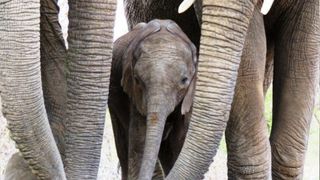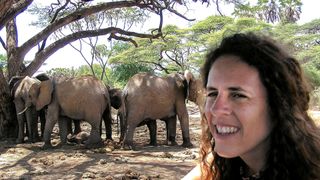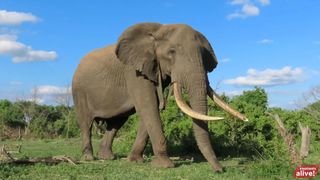Dell laptops aren't just for spreadsheets – they're also saving Elephants
Opinion: these are no ordinary laptops

African Elephant populations have declined by 97% over the past 100 years. It's a scary statistic and one that isn't only reflective of a single species, with the World Wildlife Fund Living Planet Report finding that humans have caused total wildlife numbers to fall by 60% globally in just 50 years.
Finding the right opening for an article can often take me some time, especially when the subject of my content is a serious matter, but I really didn't want to ease anyone into those numbers. Such devastating statistics warrant undiluted attention.
It's natural to feel a sense of futility when faced with this data, powerless to help the ever-worsening situation that our very existence contributes to. But not all human development comes at the cost of the planet's precious ecosystem – our technology is also being used in environmental fields to preserve animal numbers and restore some balance.
I was invited to talk to Dr. Michelle Henley, Co-founder, CEO, and Principal Researcher at Elephants Alive about how the non-profit's collaboration with Dell Technologies is helping to facilitate field research in conservation efforts to save the African Elephant.
The Elephants Alive charity has been in operation since 2003, known then as Save the Elephants, and states that its mission is to "ensure the survival of elephants and their habitats, and to promote harmonious co-existence between elephants and people". Dr. Henley's work involves, amongst other important things, identifying elephants and their movements using advanced GPS and GMS technology in order to understand their habitat use.
Elephants are distinguished via ear shapes, with each being as unique as a human fingerprint. Where simple pencil and paper were once used as the main tool to help log these wonderful animals, hardy laptops and tablets can now be taken on trails to take up to 800 high-quality photographs a day, all while withstanding the harsh environment. This clearly isn't a job for a sleek, stylish Ultrabook.

A Classic car chase
For one, standard tech isn't likely to even survive the drive, let alone finish the job. "There is a tar access road, but the rest of the roads are often horrendous," Dr. Henley said, when asked about what the team's laptops are subjected to on a daily basis "especially after all the floods and rains, it's very easy to even hit your head on the roof of the car when you go over bumps".
The Dell Latitude Rugged series is thankfully more than up to the task, but this isn't something you're likely to buy as an everyday consumer. Where most laptops and tablets have been getting slimmer and lighter over the years to better suit a traditional office or home, Latitude Rugged products are designed for a more extreme environment.
"We previously never even considered taking any laptop into the field, we would just shorten the lifespan immediately. To be able to take a computer into the field and sit there for many hours, waiting for an elephant to come out of the bush, if you've just come from a sighting where you've taken 250+ photos of five elephants elsewhere you can now sort them while you wait".
And with Elephants Alive working on ID'ing and collaring these wonderful creatures, the love she holds for them is clear – despite the obvious dangers involved with the conservation of the world's largest land animal.
She spoke fondly of an individual called Classic, a large male with 'classically symmetrical tusks', explaining "Because you're finding the same elephant over time, they get used to you and you get used to their different personalities. When Classic comes into musth (or into season/rut as we may know it), his personality changes to focus on fighting and mating. He loves chasing all the vehicles around us when this happens."
Hardy tech for a hard job

If you're in a job that needs a laptop tough enough to survive being chased by an angry bull elephant, Dell has quite literally ticked that box. These Rugged products do have a place in businesses a little closer to home of course, being widely used on construction sites and in military campaigns, but their successful use in conservation efforts proves that advancements in technology are helping our ecosystem.
In fact, the technology being developed by Dell with the Latitude Rugged series has applications in a wider variety of unexpected environments. I asked Doug Woolley, Managing Director of Dell Technologies South Africa about the industries that rely on the niche features provided by these products.
He explained "Mining, medical and pharmaceutical all use the Rugged, with one of the reasons being that they can wear gloves and still fully utilize the notebook. In a pharmaceutical situation where you need to have a very contained and clean environment, it makes a lot of sense, especially right now during the pandemic."
The vast list of features that make this product range so versatile would likely take up half the article to list, but they warrant a heavy helping of praise – with hot-swappable batteries, a near-indestructible chassis, and the ability to survive intense shifting temperatures and rainfall, Dell has designed the Rugged range to withstand just about every extreme task you force it to endure.
Enough so that when I joked about driving a tank over it, Doug actually replied that it wasn't as far-fetched from actual tests Dell had conducted. "We were at a Dell world tour a few years ago and they drove an NYC police car onto four of them, one under each wheel, and left it parked there for the full week of the conference. They were opened up on the last day and all started up without any issue".
These are described as military-grade devices after all, so testing how tough they are includes everything from being buried underground, used in showers, and even comically tossed around by the South African Springboks, as you can see in the below commercial.
A step in the right direction, no matter the size.
I won't pretend to be an expert in animal conservation or environmental impact, but 'Eco-Anxiety' has plagued me for as long as I can remember, and I hope that a large portion of society also feels this crushing weight and motivation to do better. Several generations have listened to inspirational figures like David Attenborough, Jane Goodall and Wangari Maathai with the same sense of futility as the situations worsen with every passing year.
Despite this, It's important to keep focusing on these conservation efforts and how the people at the helm have benefited from modern advancements, optimizing their efforts through technology. In the case of Elephants Alive, there are many ways to help the cause or donate money that will be used to preserve these incredible animals.
Elephants Alive works closely with the Elephants and Bees Project to use African honeybees as a deterrent method to protect Marula trees, keeping elephant populations out of areas being protected for biodiversity. Donations to the Elephants Alive non-profit will be used not only to buy things like beehives, but also support other projects documented on the charity website.
Outside of helping financially (which isn't a possibility for everyone), Dr. Henley mentioned "it would be great if people could give us a word of encouragement! It's often quite a lonely place to be in the conservation world, as there are so few people conscientious of what's happening to the planet".
She added at the close of our conversation that it's never been more important to be aware of the environment and enjoy that we share such a diverse world. "Remember elephants! We'd love to help facilitate the enthusiasm about protecting elephants because they've recently been reclassified from 'vulnerable to 'endangered by the IUCN (International Union for Conservation of Nature) and that's for good reason".
Her words echo the plea from conservationists across the world that urgent action should be taken to protect ecosystems globally, something that governments and large businesses have a responsibility to aid. With companies like Dell Technologies' helping efforts, more work can be done to give at-risk species and biomes a fighting chance.
To support Elephants Alive, please visit the charity donation page here, or leave a kind word of encouragement for the work that they do.
- Stay up to date on all the latest tech news with the TechRadar newsletter
Get daily insight, inspiration and deals in your inbox
Get the hottest deals available in your inbox plus news, reviews, opinion, analysis and more from the TechRadar team.
Jess is a former TechRadar Computing writer, where she covered all aspects of Mac and PC hardware, including PC gaming and peripherals. She has been interviewed as an industry expert for the BBC, and while her educational background was in prosthetics and model-making, her true love is in tech and she has built numerous desktop computers over the last 10 years for gaming and content creation. Jess is now a journalist at The Verge.

